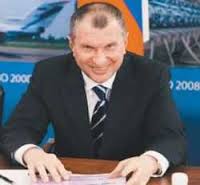
On September 16, Moscow’s Basmanny District Court placed board chairman and main shareholder of Russia’s AFK Sistema (AFKS) Vladimir Yevtushenkov, accused of money laundering by the Russian Investigative Committee (RIC), under house arrest. According to investigators, Yevtushenkov, with the intermediary of Levon Ayrapetyan, who was also arrested in Moscow, had transferred 50 million dollars to Ural Rakhimov, son of former Bashkir President Murtaza Rakhimov.
On September 16, Moscow’s Basmanny District Court placed board chairman and main shareholder of Russia’s AFK Sistema (AFKS) Vladimir Yevtushenkov, accused of money laundering by the Russian Investigative Committee (RIC), under house arrest. According to investigators, Yevtushenkov, with the intermediary of Levon Ayrapetyan, who was also arrested in Moscow, had transferred 50 million dollars to Ural Rakhimov, son of former Bashkir President Murtaza Rakhimov.
This transaction was allegedly connected with Ural Rakhimov’s selling Bashkir energy assets to AFK Sistema. Experts believe that Rosneft (ROSN) CEO Igor Sechin, who has long been interested in Bashneft (BANE), the majority shareholder of which is AFK Sistema, is behind the arrest of both Yevtushenkov and Ayrapetyan. Sistema’s shares in Bashneft had been previously frozen in the context of the same criminal inquiry conducted by RIC.
Rosneft has been growing and expanding through transactions which the Hague’s Permanent Court of Arbitration called expropriation in its recent ruling on the Yukos shareholders against Russiacase.
At the same time, Rosneft CEO Igor Sechin has asked for 1.5 trillion rubles ($40.6 billion) in financial aid from the Russian government, which he is unlikely to be denied.
Rosneft will probably be financed by the National Welfare Fund (NWF), one of Russia’s sovereign wealth funds. As of September 1, 2014, the Finance Ministry estimated the aggregate amount of the NWF at 85.31 billion dollars (a little more than 3 trillion rubles), which is equivalent to 4.4% of Russia’s GDP.
Ten years ago Yukos’s assets were acquired in a series of forced sales by state-owned Rosneft while its shareholders and managers were either incarcerated or sent into exile. Today, it seems that funds of the National Welfare Fund will soon be used to finance the handover of Bashneft into the same Sechin’s statist hands while Bashneft main owner Yevtushenkov is about to be put behind bars. As it already happened before, private business is being robbed on the Kremlin’s orders, and the scammed population, deprived of investments and future wealth, will once more have to pay the penalty.





